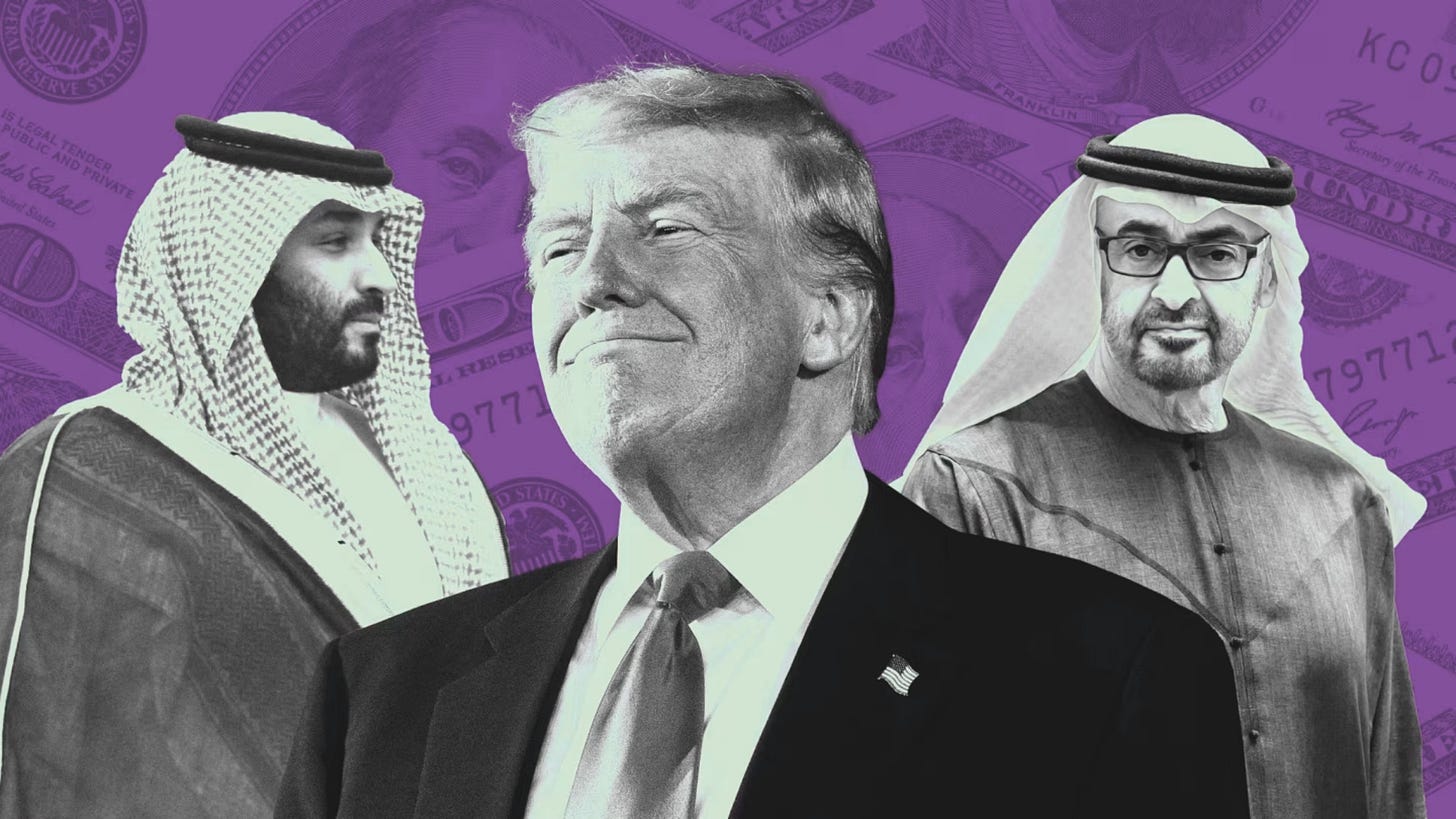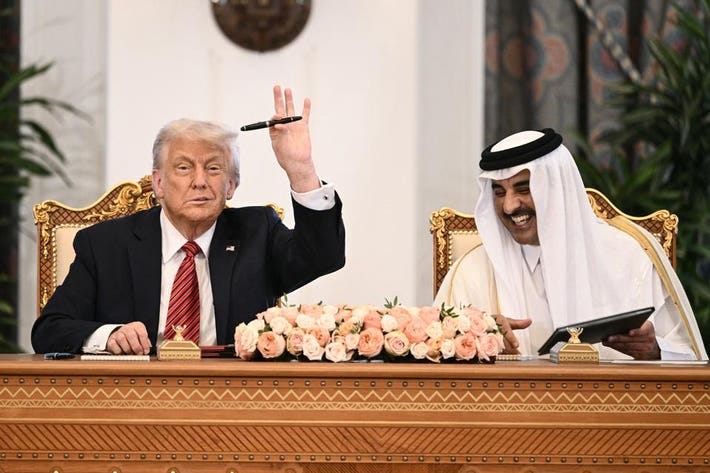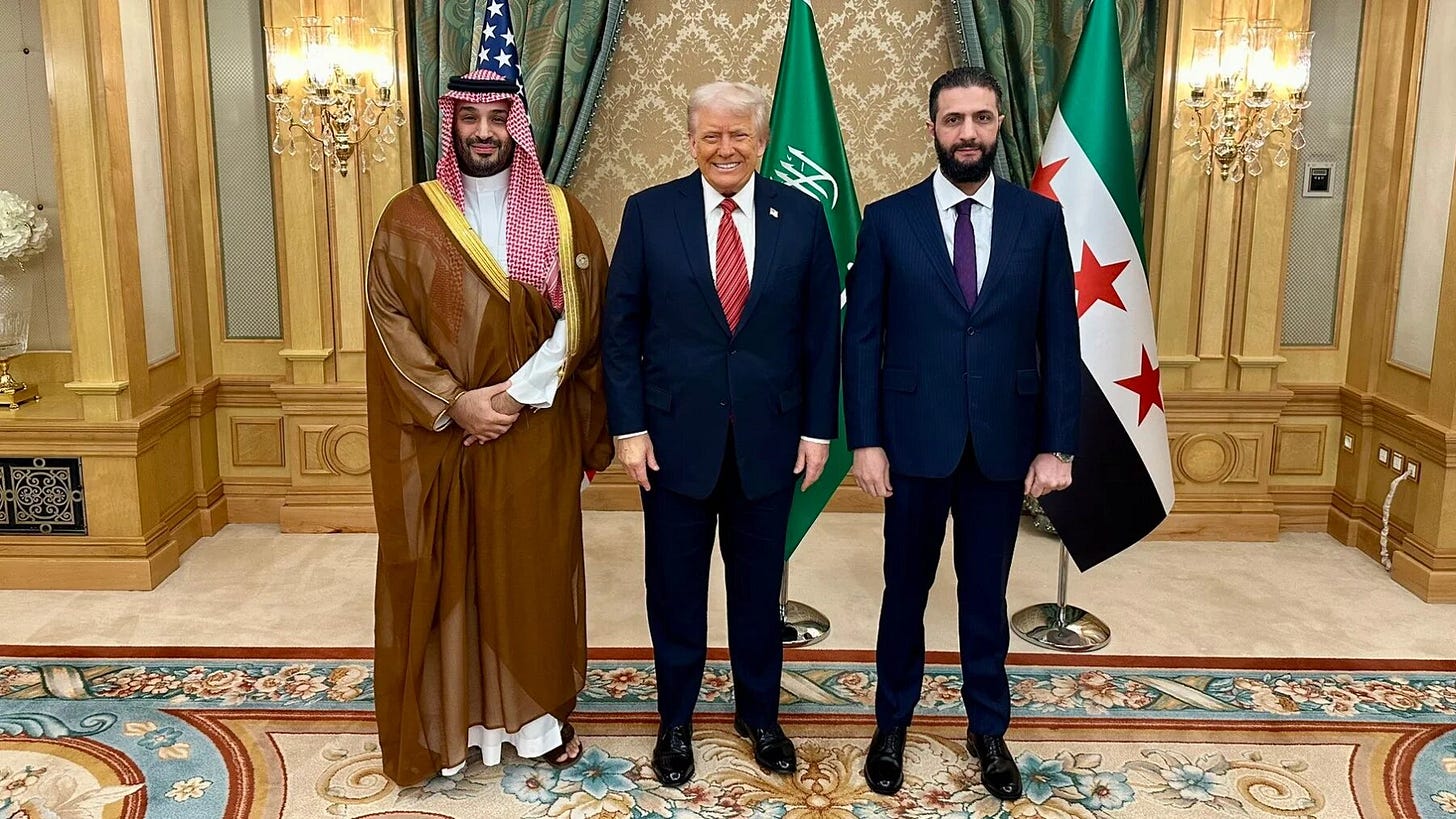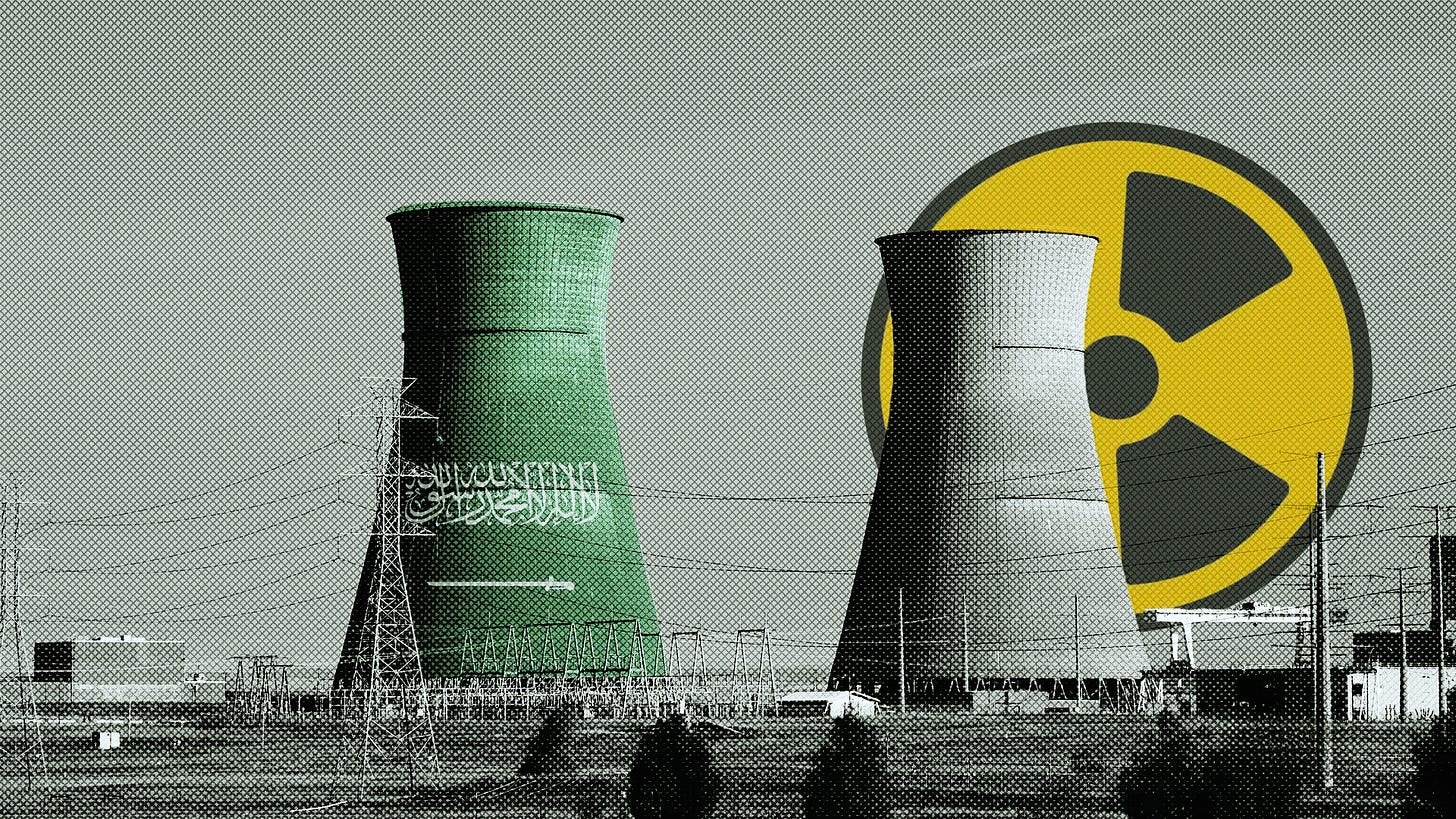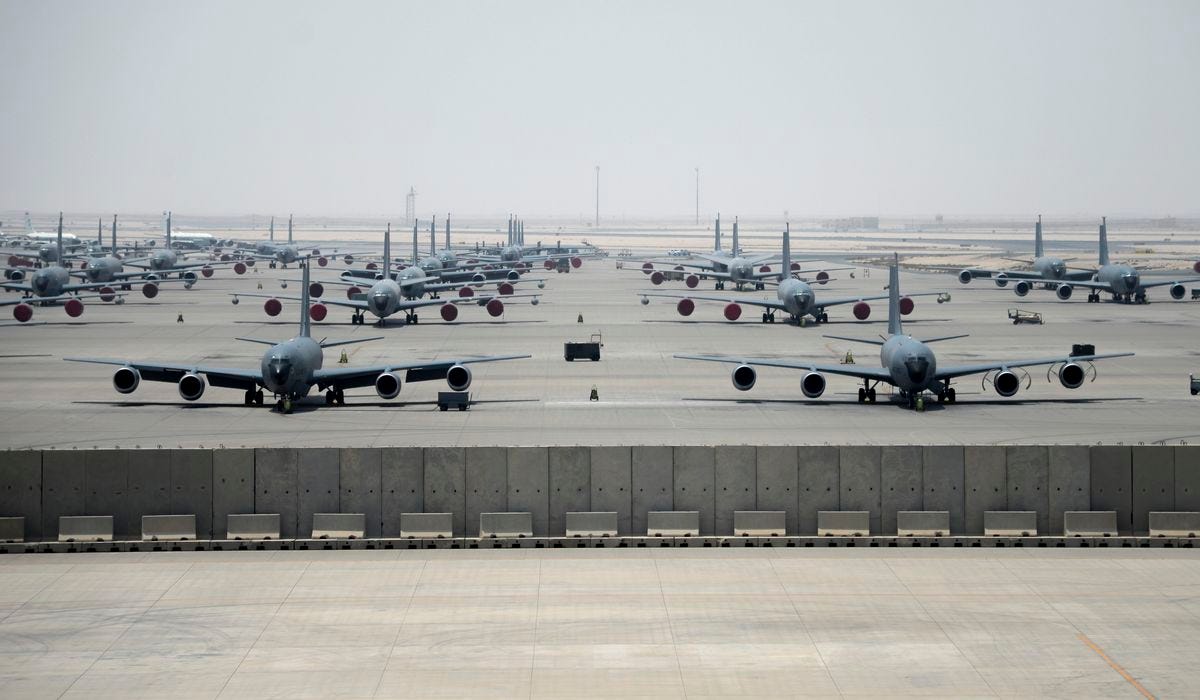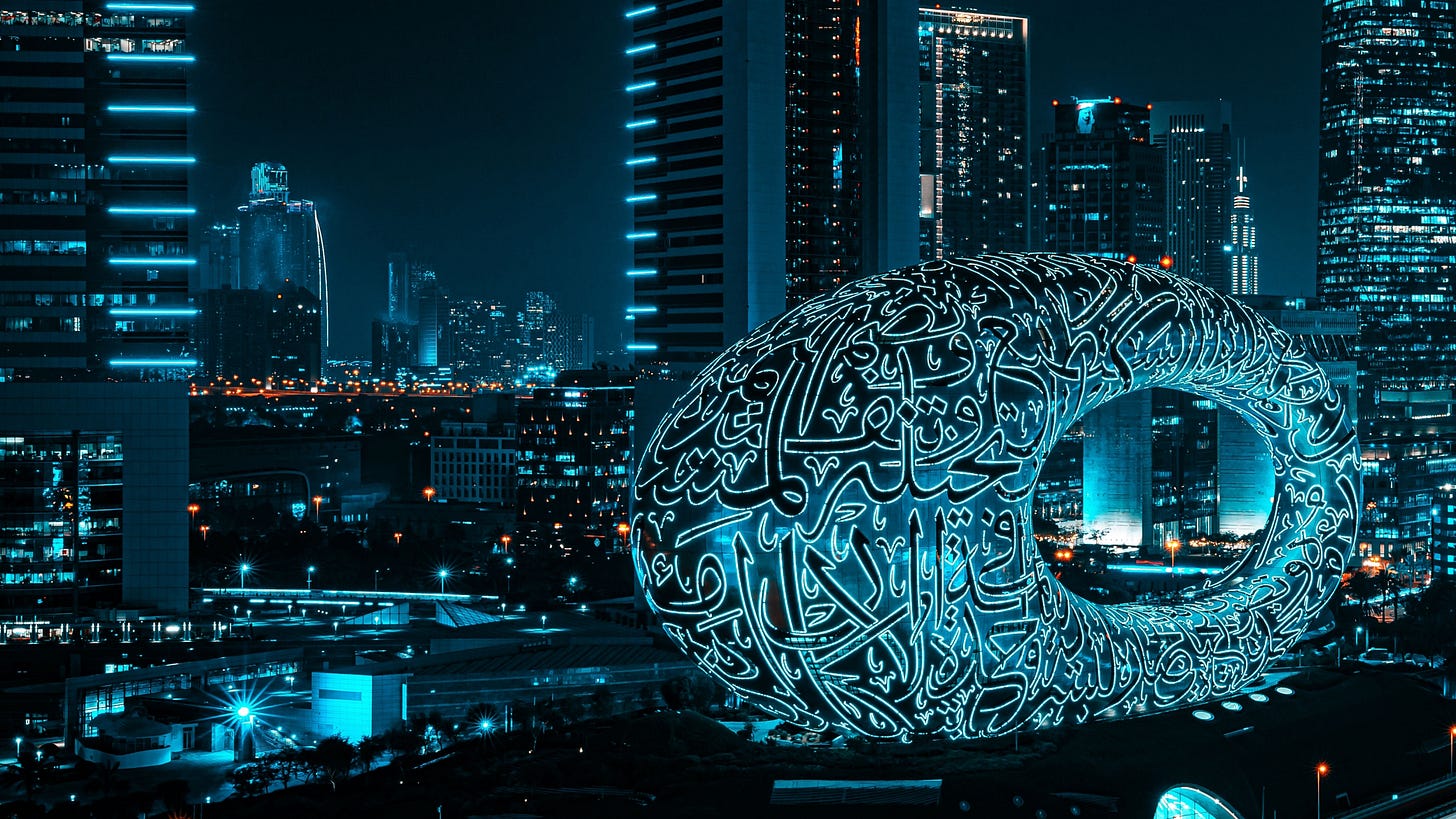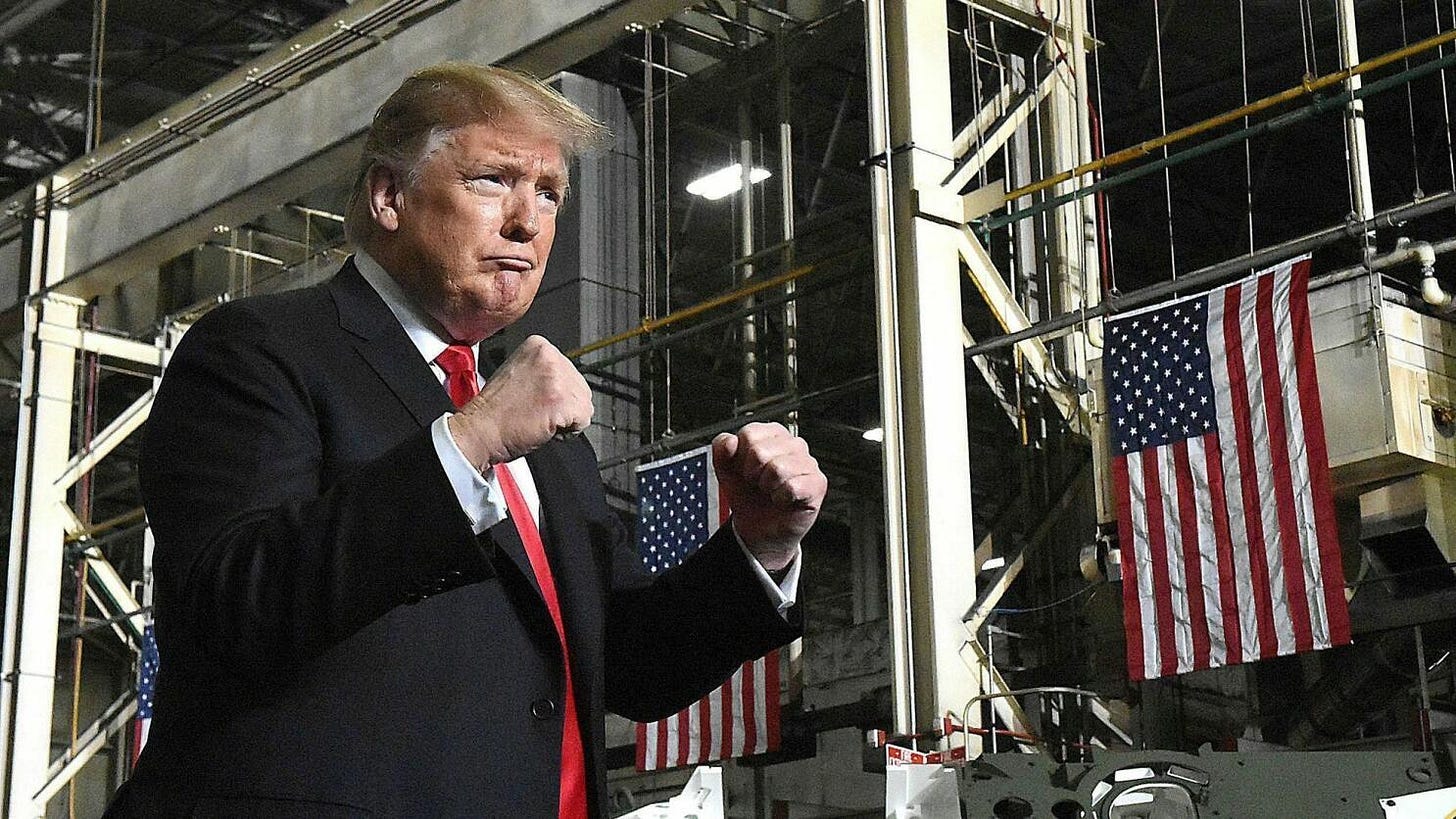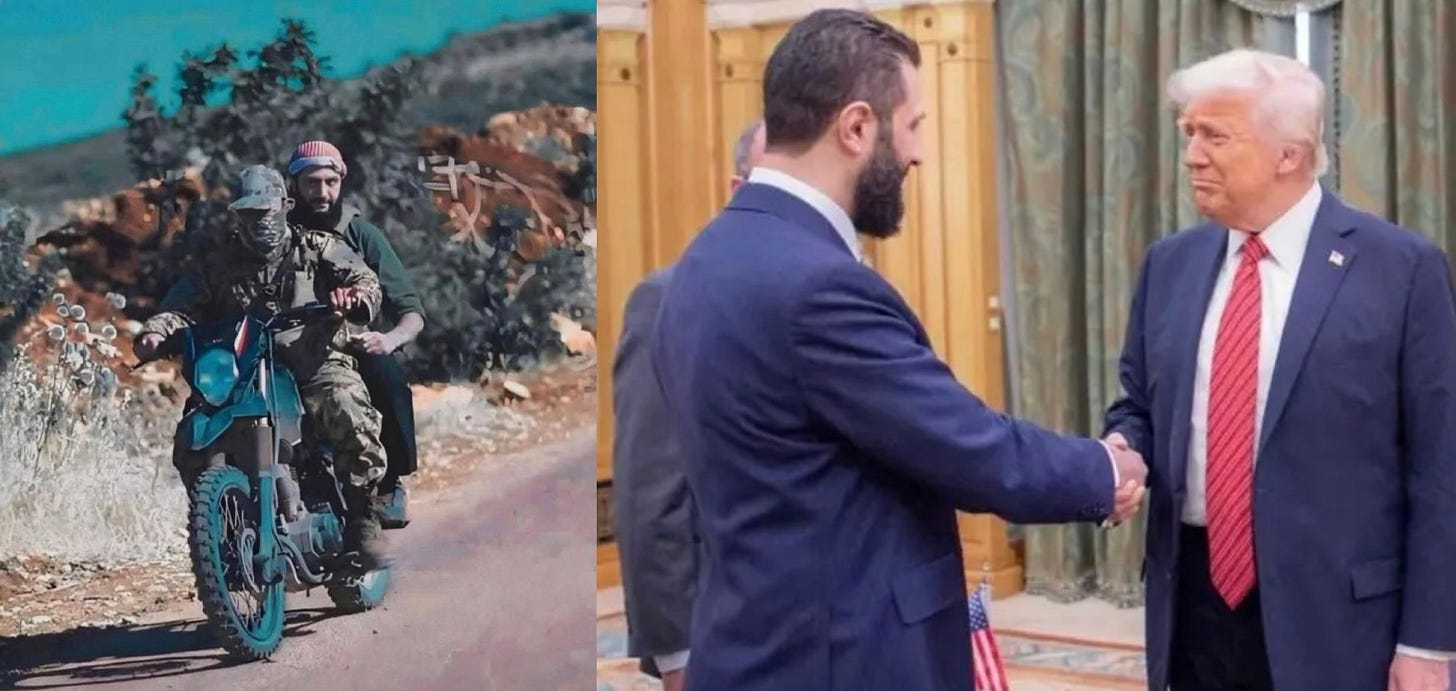Cash Me If You Can: Inside Trump’s Trillion Dollar Gulf Tour
“Politics is no longer just theater; it’s show business. So let’s put on the best show in town.”
— Francis Underwood
📡 Donald Trump returned to the Middle East with a familiar promise: America First, Deals Always. In Saudi Arabia, the UAE, and Qatar, he was received like an old business partner coming back to collect. And collect he did: the region’s rulers showered him with pledges of over $2 trillion (or is it $3 trillion? I’ve lost count) in US-bound investments.
The headline numbers were staggering:
$1.4 trillion from the UAE
$1.2 trillion from Qatar (Weird…considering Qatar has a GDP of ‘only’ $250 billion)
$600+ billion from Saudi Arabia
For anyone who actually follows the news cycle, these sky-high numbers show up with almost every state visit—and you can’t help but wonder: how on earth do they afford this every time?
On paper, these figures are historic. But as any seasoned Middle East watcher will tell you, the bigger the number, the foggier the detail. The Gulf loves a good announcement. Delivery? That’s negotiable.
♻️ Recycled Pledges, Repackaged Hype
🚀 The UAE’s $1.4 trillion package includes a few tangible projects—like a long-awaited aluminum smelter (in Oklahoma, a deep-red state, marking the first US facility of its kind in 45 years and aligning neatly with Trump’s narrative of reviving domestic manufacturing, blue-collar jobs in Republican heartlands and critical mineral supply chains in the US)
But most of these investments are a mashup of existing deals, optimistic frameworks, and political theater.
Qatar’s Boeing mega-order—$96 billion for 210 aircraft—is real and record-breaking. But the rest? A $500 billion promise for US tech and reindustrialization and another $100 billion into healthcare and AI, with few details.
Saudi Arabia signed over $300 billion in defense, tech, and energy deals. But when you’re already spending $500 billion on NEOM and oil revenues are tightening, another trillion is a big ask.
The last time Trump visited the Gulf in 2017, he announced a $110 billion Saudi arms deal. Most of it never materialized. It was later described as "more of a wish list than a contract."
💸 What’s the Real Trade Here?
Now you may be wondering. Did Trump really secure investments equivalent to the annual GDP of France in one trip? But this wasn’t just about money. These were strategic down payments. The Gulf pledged investment; Trump offered policy.
🔓 1. Syria Sanctions Off Syria
In a dramatic pivot, Trump lifted all US sanctions on Syria—not out of sudden humanitarian enlightenment, but as part of a classic “quid pro quo” for Gulf investment deals. It also marked a diplomatic first: an American president posing for a photo op with a former al-Qaeda operative turned Syrian president. If irony had a State Department, it would’ve resigned on the spot.
The move was reportedly made at Saudi and Turkish request, with both MBS and Erdogan eager to rehabilitate Syria’s government under new president Ahmed al-Sharaa.
This decision may also help explain a little-known UAE investment: DP World’s $800 million interest in operating Syria’s port at Tartous (announced the very next day). Sanctions had made that deal nearly impossible. Now? With Washington stepping aside, Tartous could become a strategic trade hub once again—and the UAE gets a commercial foothold in the Levant. And in the process, they quietly edged the Russians out of the Mediterranean. Not a bad outcome—no guns fired, just contracts signed.
🇮🇱 2. Netanyahu Gets the Cold Shoulder
Trump’s itinerary excluded Israel entirely. That’s not oversight—it’s strategy. Gulf leaders, especially the Saudis and Qataris, made it clear: no normalization until there’s real movement on Palestine. Trump complied. The message to Bibi: Not now.
⚔️ The divergence in approaches has led to a noticeable cooling of the previously close relationship between Trump and Netanyahu. Analysts suggest that Netanyahu's actions are increasingly at odds with Trump's strategic objectives in the region, which now prioritize economic partnerships and broader geopolitical realignments over unilateral military actions.
And perhaps most tellingly, the US has recently
Held talks with the Houthis over a cessation of hostilities…
and over Iran’s nuclear program as well as…
negotiated the release of an Israeli-American hostage— via backchannel talks with Hamas
All without looping in the Israelis. A clear signal that Netanyahu is no longer in the inner circle, as tensions between him and Trump quietly grow.
🇸🇦 3. Saudi Nukes?
The Kingdom still wants a civilian nuclear program, possibly including uranium enrichment. Trump’s team has shown openness to this in the past—and Saudi pledges might finally buy that elusive agreement.
Saudi Arabia isn’t just asking out of energy needs. It wants nuclear parity with Iran—or at least the appearance of it. Enrichment capability, even for “peaceful” use, sends a message: We can build our own deterrent if pushed.
🇶🇦 4. Qatar Buys Security
🪖 Qatar’s spending spree is as much about geopolitics as it is about aircraft. The $96 billion Boeing deal made headlines, but beneath the splashy numbers lies a quieter message: we’re paying to keep the Americans close.
Doha already hosts Al Udeid Air Base, the largest US military installation in the Middle East, housing over 10,000 American personnel. In theory, that makes Qatar one of the safest plots of sand on Earth. But in the Gulf, proximity isn’t always protection.
Qatar wants explicit security guarantees, advanced US weapons, and perhaps even F-35s, like the ones promised to the UAE before that deal quietly stalled. Their billions are a polite down payment on long-term American loyalty—alongside a deal sweetener when Qatar offered a £400 million new Boeing 747 to replace the aging Air Force One.
And while Washington insists that Al Udeid already signals unshakeable commitment, Qatar knows full well that bases can be packed up, redeployed, or downsized if the political winds shift. So why not make sure those bases are attached to deeper contracts, defense deals, and layers of sunk costs? As Doha sees it: better to buy the anchor than rent the ship.
🇦🇪 5. UAE Wants AI Chips, Not Export Bans
🤖 Under the Biden administration, the US imposed stringent export controls on advanced AI chips to various countries, including the UAE, due to concerns about potential technology transfer to China. These restrictions limited the UAE's ability to import cutting-edge semiconductors essential for developing artificial intelligence capabilities.
But preliminary agreement was reached to allow the UAE to import 500,000 of Nvidia's most advanced AI chips annually, starting in 2025. This deal marks a significant shift from previous policies and aims to bolster the UAE's ambitions to become a global AI hub.
Abu Dhabi gets its GPUs. Washington gets investment. Everyone wins.
👑 Geopolitics: When Big Numbers Meet Soft Power
This isn’t the first time (or the last) Gulf wealth has bought access. From Cold War-era oil diplomacy to post-9/11 arms bazaars, the Gulf has long understood that money is leverage, especially in Washington. Perhaps they’re even starting to beat the Israelis at their own lobbying game now.
The Gulf is hedging, especially in the wake of
US-China trade tensions
Israeli’s new Gaza military offensive
Washington still offers what Beijing can’t: security guarantees, Silicon Valley tech, and military dominance. These investment pledges are a bet on staying in America’s good graces. And appealing to Trump’s ego is exactly the way to do it.
But the world is also now way more multipolar, meaning if the Gulf states don’t get what they want out of Trump, they’ve got no shortage of other cards to play. And Trump is now acutely aware of this.
For Trump, these deals are campaign gold. He gets to say, "They’re investing in America because I’m back."
For Gulf leaders? A known quantity. Trump doesn’t lecture on human rights, he doesn’t complicate arms deals with morality, and he takes calls. Fast.
This is the transactional foreign policy they prefer. In fact, some Gulf insiders refer to this as the "Jared Doctrine"—the informal Trump-Kushner brand of politics where deals are king and values are optional.
🏁 The Bottom Line
This isn’t about actual trillion-dollar transfers. It’s about leverage.
The Gulf states of 2025 are not the passive oil kingdoms of the past. Today’s GCC powers are wealthier, more diplomatically agile, and deeply embedded in global markets—from venture capital in Silicon Valley to LNG in Europe to port deals in Africa and the Mediterranean.
They’ve hosted World Cups, brokered ceasefires, and even outmaneuvered Washington in peace talks. And perhaps most importantly, they're done being treated like an ATM. The old trope of Gulf monarchs as check-writing sidekicks to US power no longer holds. They want influence, not just access. Respect, not just arms deals. And they’re now confident enough to say it with a trillion-dollar smirk.
In the end, the Middle East remains what it always is: a place where everything is true, and nothing is certain.
✍🏻 Also Worth Noting
These two photos were taken just 6-months apart. Never give up on your dreams…



